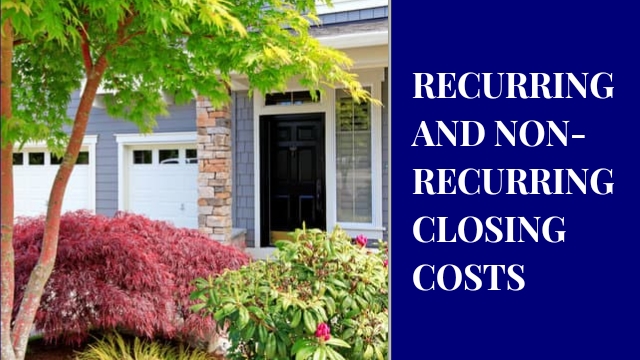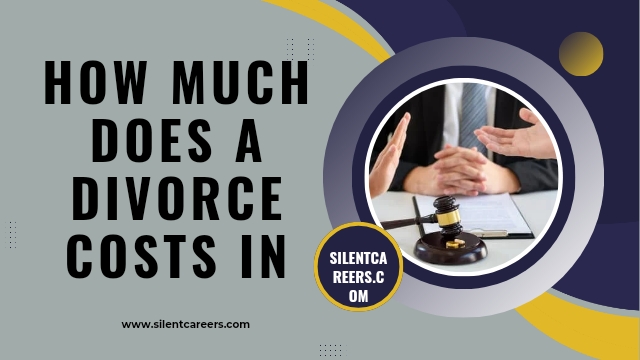
Closing costs are inevitable expenses associated with finalizing a real estate transaction. While these fees can seem overwhelming, understanding the distinction between recurring and non-recurring costs can provide clarity and help budget effectively.

What are Closing Costs?
Closing costs are the fees you incur on top of the purchase price of a property to finalize a real estate transaction. They cover various services and expenses required to transfer ownership of the property from the seller to the buyer. These costs are typically divided between the buyer and seller as agreed upon in the sales contract.
In simpler terms, closing costs act like extra taxes you pay when buying a house – they’re essential fees to complete the purchase but separate from the actual price of the property itself.
What Are the Typical Closing Costs?
Typical closing costs in a real estate transaction can include various fees and expenses. Here are some common ones:
- Loan Origination Fee: Charged by the lender for processing the loan application.
- Appraisal Fee: Paid to assess the property’s market value.
- Credit Report Fee: Covers the cost of obtaining the borrower’s credit report.
- Title Insurance: Protects the lender and buyer against any title disputes or claims.
- Escrow Fees: Fees paid to the escrow company for handling the transaction and funds.
- Recording Fees: Paid to the local government for recording the property purchase.
- Home Inspection Fees: Optional but recommended for buyers to inspect the property’s condition.
- Property Taxes: Prorated between buyer and seller based on the time of ownership transfer.
- Survey Fee: If required, this verifies property boundaries.
- Courier Fees: Charges for transporting documents between parties.
- Attorney Fees: Legal representation costs, if applicable.
- HOA Fees: Transfer fees or dues, if the property is in a homeowners association.
These costs can vary based on the location, type of property, and specific terms of the transaction. Buyers and sellers should receive a Closing Disclosure statement before the closing date, detailing all costs associated with the transaction.
Recurring Closing Costs
Recurring closing costs typically refer to expenses that occur regularly after purchasing a property. These can include:
- Property Taxes: Paid periodically (usually annually or semi-annually) to local governments.
- Homeowners Insurance: Regular premiums paid to insure the property against damage or loss.
- HOA Dues: If applicable, monthly or annual fees to homeowners associations for upkeep of common areas.
- Mortgage Insurance: Required if putting less than 20% down on a conventional loan, typically paid monthly.
These costs are ongoing and continue for as long as the property is owned or mortgaged, differing from one-time closing costs incurred during the purchase process.
Non-Recurring Closing Costs
Non-recurring closing costs in real estate transactions are one-time expenses incurred during the purchase or sale of a property. These typically include:
- Loan Origination Fee: Charged by the lender for processing the loan application.
- Appraisal Fee: Paid to assess the property’s market value.
- Credit Report Fee: Covers the cost of obtaining the borrower’s credit report.
- Title Insurance: Protects the lender and buyer against any title disputes or claims.
- Escrow Fees: Fees paid to the escrow company for handling the transaction and funds.
- Recording Fees: Paid to the local government for recording the property purchase.
- Home Inspection Fees: Optional but recommended for buyers to inspect the property’s condition.
- Survey Fee: If required, this verifies property boundaries.
- Courier Fees: Charges for transporting documents between parties.
- Attorney Fees: Legal representation costs, if applicable.
These costs are typically paid at the closing of the real estate transaction and are not recurring over time like property taxes, insurance premiums, or homeowners association dues.
Recurring and Non-Recurring Closing Costs
Recurring and non-recurring closing costs in real estate transactions serve different purposes and are incurred at different times during the purchase or sale of a property:
Recurring Closing Costs:
- Property Taxes: Paid regularly to local governments, often semi-annually or annually.
- Homeowners Insurance: Ongoing premiums to insure the property against damage or loss.
- Mortgage Insurance: If required, typically paid monthly until certain conditions are met (e.g., reaching 20% equity).
- HOA Dues: Monthly or annual fees to homeowners associations for upkeep of shared facilities.
Non-Recurring Closing Costs:
- Loan Origination Fee: Charged by lenders for processing the loan application.
- Appraisal Fee: Covers the cost of determining the property’s market value.
- Title Insurance: Protects against any title disputes or claims.
- Escrow Fees: Paid to the escrow company for managing funds and documents.
- Recording Fees: Charged by local governments for recording the property sale transaction.
- Home Inspection Fees: Optional but recommended for assessing the property’s condition.
- Survey Fee: Verifies property boundaries.
- Attorney Fees: Legal representation costs, if necessary for the transaction.
These costs are typically detailed in the Closing Disclosure statement provided to buyers and sellers before the closing date, ensuring transparency in the transaction process.
Advantages & Disadvantage in Recurring and Non-Recurring Closing Costs
There aren’t inherent advantages or disadvantages to recurring and non-recurring closing costs themselves, as they both play essential roles in the real estate transaction. However, understanding the differences can be advantageous for both buyers and sellers:
Advantages of Knowing Recurring vs. Non-Recurring Costs:
- Budgeting: Separating these costs helps with more accurate budgeting for both the upfront closing process and ongoing expenses as a homeowner.
- Long-Term Planning: Understanding recurring costs allows buyers to factor in property taxes, HOA fees, and insurance into their long-term financial planning for the property.
- Negotiation: For sellers, knowing the breakdown of closing costs can be helpful during negotiations. Highlighting non-recurring costs they’ll cover can incentivize buyers.
Disadvantages of NOT Knowing Recurring vs. Non-Recurring Costs:
- Surprise Expenses: Buyers unaware of recurring costs might be surprised by ongoing property taxes or HOA fees, impacting their financial well-being.
- Underestimating Closing Costs: Not understanding the full picture of closing costs, including recurring ones, can lead buyers to underestimate the total financial commitment.
- Missed Savings Opportunities: Sellers unaware of the breakdown might miss opportunities to negotiate covering some non-recurring costs to entice buyers.
In conclusion, although recurring and non-recurring closing costs themselves aren’t inherently advantageous or disadvantageous, understanding the distinction empowers both buyers and sellers to make informed financial decisions throughout the real estate transaction.
Read more: Grandfathered Property Rights in California
Real Estate Attorneys Guiding Residents of Boston
I don’t have specific information on real estate attorneys in Boston. It’s generally advisable to seek local listings or referrals from trusted sources to find qualified attorneys who specialize in real estate law in the Boston area. They can assist with various aspects of real estate transactions, including legal contracts, property disputes, and closing processes.
Since you’re looking for real estate attorneys in Boston, I can’t provide legal advice or recommend specific firms. However, I can help you find some well-regarded options! Here are a few ways to get started:
- Online Directories:
- Justia: Real Estate Lawyers Boston MA
- Super Lawyers: Best Boston, MA Real Estate Attorneys
- BCG Search: Best Real Estate Law Firms in Boston, MA [invalid URL removed]
- Local Bar Association: The Boston Bar Association likely has a directory of real estate attorneys: Boston Bar Association
- Word-of-Mouth Recommendations: Talk to friends, family, or colleagues who have recently bought or sold property in Boston. They may have had positive experiences with a real estate attorney they can recommend.
- Reviews: Many law firms have online reviews. While these shouldn’t be the only factor in your decision, they can provide some insight into other client experiences.
Remember to consider your specific needs and budget when choosing a real estate attorney. Good luck with your search!
Discuss a Real Estate Matter with a Boston Lawyer
I don’t have the capability to connect you with a specific lawyer or discuss legal matters directly. For real estate matters in Boston, it’s recommended to contact local law firms specializing in real estate law. They can provide legal advice and representation tailored to your specific needs and circumstances. Initiating a consultation with a Boston lawyer specializing in real estate will ensure you receive accurate guidance and assistance with your real estate concerns.
I can’t directly connect you with a lawyer, but I can help you prepare for your consultation with a Boston real estate attorney. Here are some steps to take:
- Identify Your Legal Issue:
- Are you buying or selling property?
- Do you have questions about a contract, zoning, or title issues?
- Are you facing a potential foreclosure or eviction?
- Gather Relevant Documents:
- Purchase agreements, deeds, titles, appraisals, inspection reports (if applicable).
- Prepare Questions:
- Draft a list of specific questions and concerns you have about your real estate situation.
- Ask about fees and the typical timeline for your case type.
- Research Potential Lawyers:
- Use the resources I provided earlier to find attorneys specializing in your area of concern.
- Read online reviews and check their websites for practice areas and experience.
- Schedule Consultations:
- Many lawyers offer initial consultations, which may be free or have a set fee.
- This allows you to discuss your case and get a feel for the lawyer’s personality and approach.
Here are some additional tips:
- Be upfront and honest about your situation.
- Be clear about your desired outcome.
- Take notes during your consultation.
- Don’t feel pressured to hire the first lawyer you meet. Interview a few to find the best fit.
By following these steps, you can be well-prepared to discuss your real estate matter with a Boston lawyer and make an informed decision about your legal representation.








